
From the Desk of Senator Blake
Republicans spent the week attacking judicial independence and Iowa workers.
They passed SF 407 that takes away our fair, merit-based system for selecting district court judges, giving politicians more control over who sits on the bench. Iowa used to be a national model for keeping politics out of the courts. Now, Republicans want to stack the system with their allies.
Republicans also introduced and passed an amendment to a bill in roughly 24 hours that attacks Iowa workers. The legislation blocks local governments from prioritizing skilled workers and apprenticeships for public projects. That means fewer well-trained Iowa workers on job sites and weaker protections for taxpayers.
Decreasing Revenues and Bad Budgeting
It’s clear the majority party’s budgeting isn’t working for Iowans. It’s not working for the children whose public schools are underfunded, it’s not working for the thousands of workers being laid off, and it’s not working for the families trying to cover the cost of childcare or find housing they can afford.
Now, after years of massive corporate tax breaks, Republican lawmakers’ runaway voucher spending will continue the misguided budgeting trends into the next five years.
The state’s Revenue Estimating Conference (REC) met last week to update their projections for the state’s revenues for the current and upcoming fiscal years (the REC meets every October, December, and March). According to their estimates, the panel projects state revenues will drop by over $1.2 billion in just two years, between FY24 and FY26. To put it mildly, that is a significant decrease.
For FY26, the governor has proposed appropriations (spending) of $9.433 billion, which, thanks to our decreasing revenue, is $925 million more than Iowa’s projected revenues. Gov. Reynolds is planning on spending more money than the state takes in during the 2026 fiscal year.
Now, here in Iowa, the governor is statutorily obligated to sign a balanced budget. So, the $925 million difference has to come from somewhere. It comes from two places, in fact. The first is from the Taxpayer Relief Fund (TRF) and the second is from carryforward surplus dollars from previous years. These are both one-time funds.
In a five-year projection provided by the state’s Department of Management (see below), the Reynolds Administration is planning on dipping into these reserve funds to the tune of hundreds of millions of dollars for each of the next five fiscal years. That means the governor is planning on spending more money than the state takes in for five straight years and covering her poor budgeting with a dwindling supply of one-time money.

In this table, the top row represents actual and projected state revenues for the given fiscal year (actual for years past, projected for years future).
In the bottom row, you can see the one-time money the governor plans to transfer from the Taxpayer Relief Fund to cover the deficit in her budgets. The TRF can only be used to cover up to 50% of the deficit, so the gap between projected revenues and projected spending is actually double the number in the bottom row.
Visit Your Iowa Capitol!
One of my favorite aspects of serving in the Iowa Senate is coming to work in the beautiful Iowa State Capitol. Each day the building is filled with groups of Iowans from every corner of our state, from lobby days to school trips to sightseeing excursions, and more. All visitors are welcome in the People’s building.
If you’ve never taken the opportunity to visit, we’d love to see you! Here are a few tips if you’re planning a trip to the Golden Dome.
When to come: The Capitol is open year-round between 8:00 a.m. and 5:00 p.m., Monday through Friday, and 8:00 a.m. to 4:00 p.m. on Saturdays. The House and Senate are typically in session Monday through Thursday between January and late April or early May, so if you’re looking to meet your legislators or see the Legislature in action up close and personal, you’ll need to plan accordingly.
Take a tour: The Capitol is truly a sight to behold, full of art and history. The Capitol is staffed by highly knowledgeable guides who lead tours throughout the day and can give an in-depth history behind the building and its unique characteristics. If a self-guided tour is more your speed, those are available as well. For groups of 10 or more, please click here to request in advance.
Watch a debate: The Senate and House galleries are open to the public during all periods of debate. You can sit in, watch the discussion, and see the votes cast in person from a seat overlooking the chamber.
Meet me in the rotunda: I am always happy to meet with my constituents, so please come say hi! Outside the Senate chamber, on the second floor, there is a pad of “pink slips” where you can write a message and provide your contact information. Hand the slip to a Senate employee near the Senate chamber door and they’ll hand-deliver it to the senator on the floor. When there’s a break in the action, I’ll come out to say hello, hear your concerns, and take a photo, if you’d like!
Let’s make a plan: If you know you’re going to be visiting the Capitol – especially with a group – please reach out in advance and I’ll be happy to assist you. If I know you’re coming, I can be sure to set aside time to meet and even formally introduce and recognize you on the Senate floor.
Quick Updates
-
Equal Pay Day: Celebrated on a different day each year, Equal Pay Day highlights the gender wage gap across various industries and demographics. According to recent data, the gender pay gap for women is currently 83% for full-time, year-round workers and 75% for all workers (including part-time and seasonal). This year, Equal Pay Day is celebrated on March 25, the 84th day of the year – that means, by most recent data, it takes a woman one year and 84 days to earn the amount of money a man earns in one year. Looking for opportunities to take action? Visit www.aauw.org/issues/equity/pay-gap/ to learn more about the wage gap and what you can do to fight it.
-
Rural Healthcare Struggles: This NPR article takes an in-depth look at the state of rural hospitals in Iowa, and it’s not good. It’s clear that significant investment is necessary to keep rural hospitals operational in Iowa so that all Iowans can access care when they need it.
-
Federal Cuts Impact Local Food Programs: The Trump Administration has cut $11.3 million in federal funding that provides thousands of Iowa children with locally produced meat, dairy, fruits, and vegetables at schools, daycares, and food banks across the state. The cuts, affecting funding from 2025 to 2028, followed the U.S. Department of Agriculture’s announced scaled-back spending as part of President Trump’s broader budget reductions. Farmers and advocacy groups warn that the funding loss threatens both access to nutritious food and the financial stability of local producers. An Iowa Farmers Union spokesman said Iowa producers had already planned over $3 million in food sales for 2025 through these now-defunded programs.
-
Golden Owl for Local Educator: Last week, seven educators were honored across Iowa as finalists for the 2024-25 Golden Owl Award, which recognizes excellence in agriculture education. This award highlights the vital role of agriculture educators in shaping the future of the industry. This year saw a record 570 nominations for 131 exceptional educators in both secondary and postsecondary education. Each finalist was celebrated at a special event in their home district or community college, receiving an engraved plaque and a $500 prize. They now move forward as contenders for the 2024-25 Golden Owl Award, which comes with a $3,000 grand prize and the Golden Owl trophy. Congratulations to Andrea Rouse of DMACC for their impact and commitment to agricultural education!
-
Defining “Proficient”: Reviewing your child’s assessment reports can generate a lot of questions including, what does it really mean for my child to be “proficient” at reading? Iowa’s Reading Research Center (IRRC) staff answers in this month’s Ask IRRC video. You can learn more about literacy assessments and what they mean for your child by visiting a new eLearning module, Understanding Your Student’s Literacy Data.
-
Iowa Workforce Grant and Incentive Program: Do you know a junior or senior at one of Iowa’s public universities pursuing a “high-demand” career field? Find out if they may be eligible for the Iowa Workforce Grant and Incentive Program! This program provides grants for up to four semesters and offers a $2,000 incentive payment to students who accept a high-demand job in Iowa within six months of graduation and work full-time for at least 12 consecutive months. Don’t miss this opportunity to fund your education and launch your career in Iowa!
-
Diesel Emission Reduction Grants: The Iowa Department of Transportation is accepting applications through May 9 for diesel emission reduction grants. The Diesel Emission Reduction Program (DERA), part of the U.S. Environmental Protection Agency, was created as part of the Energy Policy Act of 2005, and is designed to achieve significant reductions in diesel emissions among on-road or non-road vehicles and equipment, including school buses, medium- and heavy-duty transit buses and trucks, marine engines, locomotives, and nonroad engines, equipment, or vehicles.
This Week in the Capitol
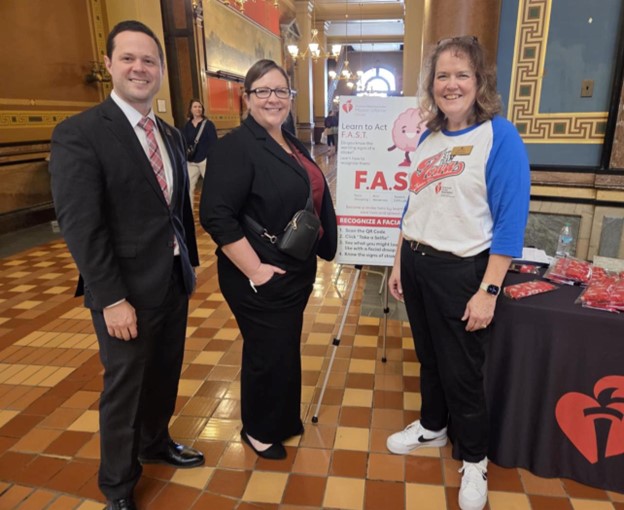
On Monday, I met with leaders from the Iowa Division of the American Heart Association.
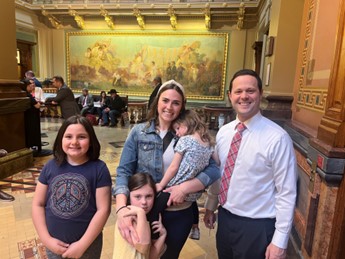
I had a chance to show an Urbandale family around the Capitol on Tuesday!
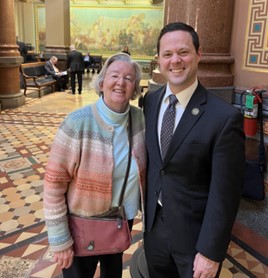
I met with Johnston constituent Amy Christensen on Wednesday during Refugee Day on the Hill, where we discussed how we can support Refugees in Iowa.
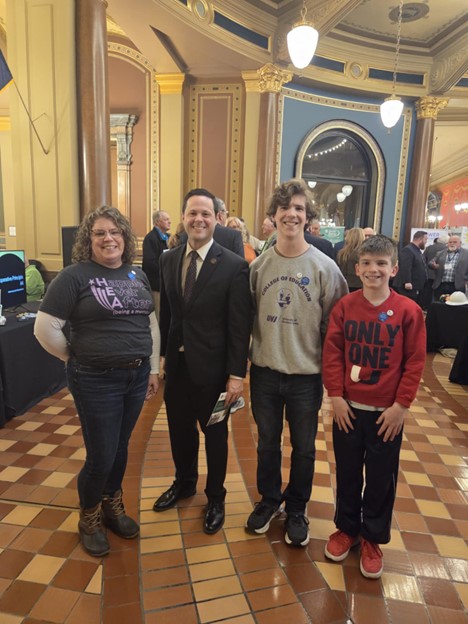
Wednesday was ISEA Day! I had a chance to meet with Neas family from Urbandale and chat about the importance of our Public Schools.
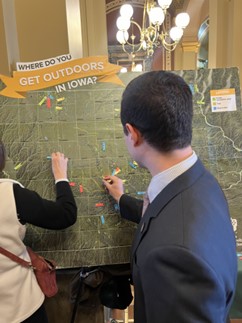
Thursday was Celebrate Iowa's Outdoors Day on the Hill! I was able to meet with passionate individuals dedicated to protecting Iowa's land and wildlife.
Contact Senator Matt Blake at [email protected] or follow him on social media.
Facebook
Instagram
Twitter
Did you receive this newsletter from a friend?
Subscribe here.